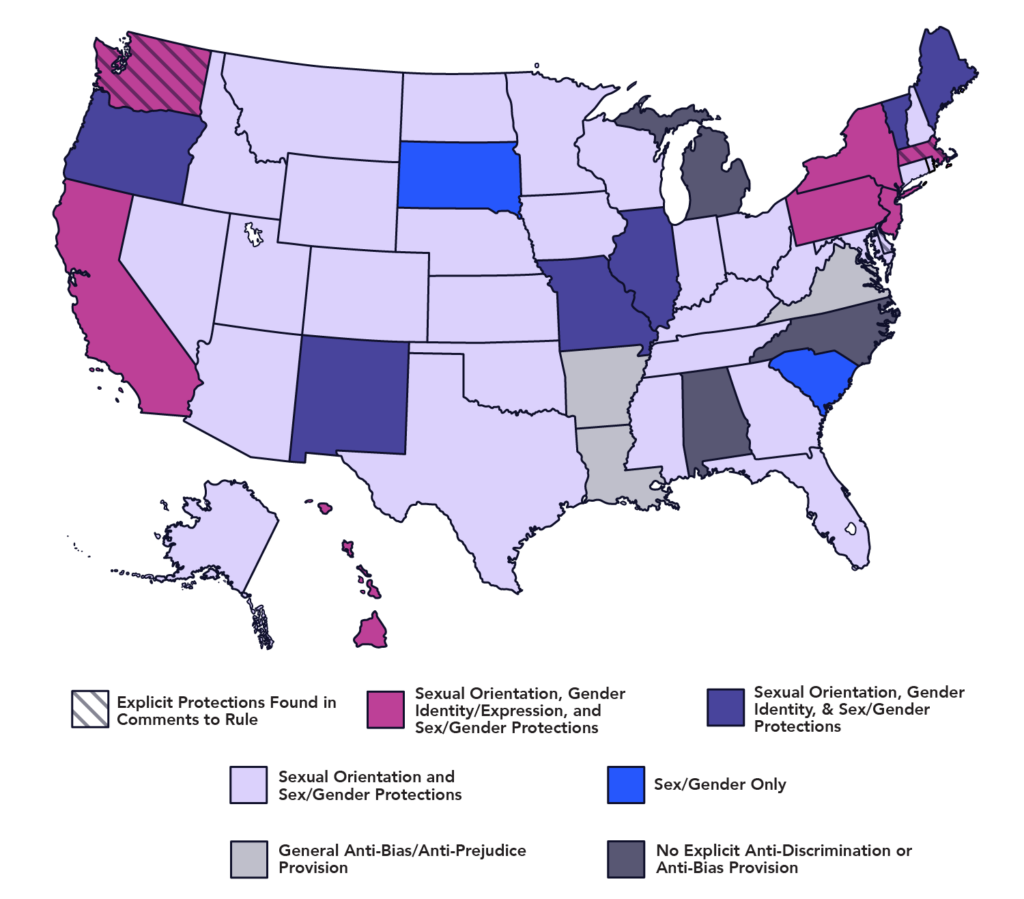“I told my lawyer that I identify as transgender female. After I told her, it was like she didn’t want to fight for me at all and kept calling me by the wrong pronouns.” — A white transfeminine participant, Protected and Served? (2022)
By Ethan Rice, Lambda Legal Senior Attorney for the Fair Courts Project
In 2022, Lambda Legal surveyed more than 2,500 LGBTQ+ community members and community members living with HIV about misconduct involving police, courts, prisons, jails, schools, and other government agencies. As part of that survey, Protected and Served? (2022), we found that LGBTQ+ survey respondents and respondents living with HIV who had been in court within the previous five years commonly reported negative experiences in court.
More than half of the transgender, gender- nonconforming, and nonbinary participants with experience in court, reported that a court employee misgendered them. Other negative experiences reported include participants who had their sexual orientation, gender identity, or HIV status inappropriately revealed in the courthouse; and those who heard judges, attorneys or court employees make negative comments about LGBTQ+ people and/or people living with HIV.
These negative experiences, caused by both judges and attorneys, harm our community members and reduce public confidence in the court system. But there is a way to hold these judges and attorneys accountable if they are biased or prejudiced against someone based on their sexual orientation, gender identity, or gender expression.
Every state and federal court, except for the U.S. Supreme Court, has an enforceable code of judicial conduct that sets out the ethics rules judges are required to follow. Likewise, each state and federal court has rules of professional conduct setting out the ethics rules that attorneys must follow. If judges or attorneys violate these ethics rules, they can be subject to consequences that generally range from private reprimands to disbarment or removal from the bench.
Holding Justice Accountable is a new resource that compiles this information on whether each state’s ethics rules for attorneys and judges prohibit bias, prejudice, or discrimination on the basis of sex/gender, sexual orientation, gender identity, and/or gender expression. There are two maps that show this information:
Below each map you can find further information about each state’s ethics rules and how to file a complaint against a judge or an attorney, if you feel they have violated ethics rules. These maps are intended both to help people file a complaint in their state if they experience bias or prejudice in the court system, and to inform advocates about the states where more advocacy is needed to expand anti-discrimination protections for LGBTQ+ people and people living with HIV in the legal system.
Everyone, including LGBTQ+ people and people living with HIV, deserve fair and impartial courts and experiences with attorneys and judges that are free from bias, prejudice, or discrimination. While most judges and attorneys live up to what is expected of them, we know from our research that not all do.
Holding Justice Accountable is the only resource available to provide comprehensive information about what anti-discrimination rules apply to judges and attorneys when it comes to LGBTQ+ people in the legal system.
We strongly encourage people to use it and share it widely, so that the word is spread that LGBTQ+ people and people living with HIV have the right to be free from discrimination within the legal system itself.


